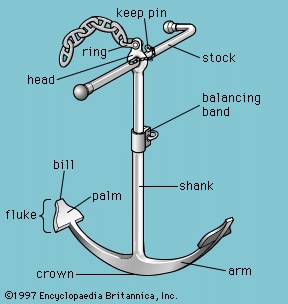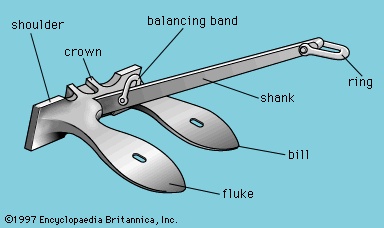anchor
nautical device
device, usually of metal, attached to a ship or boat by a cable or chain and lowered to the seabed to hold the vessel in a particular place by means of a fluke or pointed projection that digs into the sea bottom.
Ancient anchors consisted of large stones, basketfuls of stones, sacks filled with sand, or logs of wood loaded with lead; these held the vessel merely by their weight and by friction along the bottom. As ships became larger, they required a more effective device to hold them, and wooden hooks that dug into the sea bottom came into use as anchors. Iron replaced wood in their construction, and teeth or flukes were added to help the hooks dig into the bottom. Another major improvement was the addition of a stock, or horizontal arm, that is set at right angles to the arms and flukes of the lower part of the anchor. The stock ensures that the arms rest vertically on the seabed, and thus one fluke will dig itself in, providing maximum holding power. This type, with its two flukes and its stock at right angles, remained the basic anchor for many centuries. It is known as a stock anchor in the United States and as a fisherman's anchor in the United Kingdom.
 Curved arms began to replace straight arms in anchors early in the 19th century. This type of anchor, which is still used for light work and for boats, is shown in Figure 1-->
Curved arms began to replace straight arms in anchors early in the 19th century. This type of anchor, which is still used for light work and for boats, is shown in Figure 1--> . The ring (or shackle) is the part of the anchor where the chain or cable is attached. By removing the keep pin, the stock can be removed from the head so that the anchor can be stowed flat on an anchor bed in the ship. The stock must then be folded out again (i.e., stocked) before letting go, to ensure that one of the flukes digs into the ground. The vertical shaft of an anchor is called a shank; it contains a balancing band fitted at the anchor's centre of gravity so that the anchor balances horizontally when lifted. The shank is joined to each arm at the crown. At the end of each arm is a fluke, which consists of a triangular flat face (i.e., a palm) with a pointed bill that digs into the ground.
. The ring (or shackle) is the part of the anchor where the chain or cable is attached. By removing the keep pin, the stock can be removed from the head so that the anchor can be stowed flat on an anchor bed in the ship. The stock must then be folded out again (i.e., stocked) before letting go, to ensure that one of the flukes digs into the ground. The vertical shaft of an anchor is called a shank; it contains a balancing band fitted at the anchor's centre of gravity so that the anchor balances horizontally when lifted. The shank is joined to each arm at the crown. At the end of each arm is a fluke, which consists of a triangular flat face (i.e., a palm) with a pointed bill that digs into the ground. The stockless anchor (Figure 2-->
The stockless anchor (Figure 2--> ), which was patented in England in 1821, came into wide use principally because of its ease of handling and stowing. The crown, arms, and flukes of a stockless anchor are cast in one piece and can pivot slightly from side to side on the shank. The flukes are long and heavy, and have projecting shoulders at their base that catch on the seabed. As more drag is exerted, the shoulders force the flukes downward into the bottom. Stockless anchors have replaced the older stock anchor on most of the large ships of the world.
), which was patented in England in 1821, came into wide use principally because of its ease of handling and stowing. The crown, arms, and flukes of a stockless anchor are cast in one piece and can pivot slightly from side to side on the shank. The flukes are long and heavy, and have projecting shoulders at their base that catch on the seabed. As more drag is exerted, the shoulders force the flukes downward into the bottom. Stockless anchors have replaced the older stock anchor on most of the large ships of the world.Several other types of anchors are in common use. Lightweight, Danforth, and plow anchors have long, sharp flukes that pivot around a stock at the bottom of the shank and bury themselves deeply into the bottom; these anchors are generally used for yachts and other small craft. The mushroom anchor is shaped like an upside-down mushroom and is used widely as a permanent mooring for lightships, dredges, and lighters.
- C.I. Lewis
- ciliaris muscle
- ciliate
- Cilicia
- cilium
- Ciller, Tansu
- Cilli, Ulrich II von
- Cimabue
- Cima da Conegliano, Giovanni Battista
- Cimarosa, Domenico
- Cimarron River
- cimbalom
- Cimbri
- Cimmerian
- Cimon
- Cimon Of Cleonae
- Cinchona
- Cincinnati
- Cincinnatian Series
- Cincinnati Arch
- Cincinnati, Society of the
- Cincinnati Symphony Orchestra
- Cincinnati, University of
- Cincinnati Zoo and Botanical Garden
- Cincinnatus, Lucius Quinctius